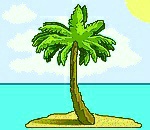
 |
itsislandtime > Corsica > Corsica Information | |
| itsislandtime.com | ||
|
Corsica |
|||||||||||
By Beachcomber, retrieved from Wikipedia Nov 2, 2003, 16:32 Corsica (Corsican: Corsica, French: Corse) is an island in the Mediterranean Sea, located roughly west of Italy, south-east of France and north of Sardinia (Italy), and currently governed as a part of the French Republic.
At present, Corsica is a region of France with 250,000 inhabitants. It has an area of 8,682 square kilometres. Corsica is largely mountainous, culminating in Monte Cinto (2,710 m) The island has a natural park (PNRC, Parc Naturel Régional de Corse) protecting thousands of rare animal and plant species. It was created in 1972 and includes the Golfe de Porto, the Réserve Naturelle de Scandola (Unesco World Heritage Site), and some of the highest peaks on the island.
As a strategic position, Corsica has been considered significant as a platform for military operations, which were violent and ongoing between Italy and France for centuries. The possible unification with Sardinia has however always been seen as a dangerous eventuality, especially by the UK, because it would have granted to their ruler an overwhelming power over the Mediterranean Sea. Another important figure is Pasquale Paoli (1725-1807), the Corsican general and patriot, who struggled for Corsican independence, first against Genoa, then against France. The city state of Genoa held sway for centuries before giving Corsica to France in 1768 to help pay off a debt.
The regional capital of Corsica is Ajaccio (Corsican: Aiacciu). The region is divided in two départements: Corse-du-Sud and Haute-Corse. The former Corse département (#20) was divided into two départements on September 15, 1975. Main towns: (Corsican names) Ajaccio (Aiacciu) Saint-Florent (San Fiurenzu)
Tourism plays a major role in Corsican economy. The island's pleasant climate, the beautiful mountain and sea landscapes make it a popular destination among the French and other Western Europeans.
There are several movements on the island for Corsican independence, although some are rather in favor of autonomy. Generally speaking, autonomist proposals focus on the promotion of the Corsican language, more power for local governments, and some supplementary exemptions from national taxes (Corsica already enjoys some exemptions.). The French government is opposed to the idea, fearing it would threaten the unity of France. In any case, independence movements never get a majority of the votes in the island, indicating the probable lack of support for independence among the locals. Some groups who claim to support Corsican independence have launched a campaign of bombings and assassinations. In addition, some of these groups are known to practice extortion, making them similar to mafias; those who do not comply with their demands may get their belongings destroyed. They also use other intimidation tactics against those who do comply to their demands; for instance, on the night of September 4 to 5, 2003, the car of journalist Christine Clerc was machine-gunned after she had written a September 1 article in Le Figaro on the topic of intimidation and crime against non-Corsicans living in the island. On February 6, 1998, prefect Claude Érignac was murdered. On July 4, 2003, principal suspect Yvan Colonna was arrested. In 2000, Prime Minister Lionel Jospin agreed to grant an increased degree of autonomy to Corsica, in exchange for a cessation of violence. This was opposed by the Gaullist opposition in the French National Assembly, on the grounds that it would lead to autonomy also for other regions (Brittany, Provence, Alsace, etc.), and that would in turn lead eventually to the breakup of France; in any case, autonomy for Corsica has created a precedent for devolution to other French regions also. In a referendum on July 6, 2003, a majority of Corsican voters opposed a project from the government of Jean-Pierre Raffarin and interior minister Nicolas Sarkozy that would have modified the political institutions of the island and granted them greater autonomy. Click here for the full Wikipedia article.
|